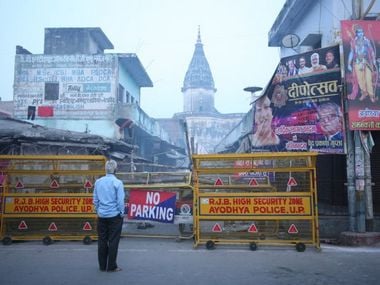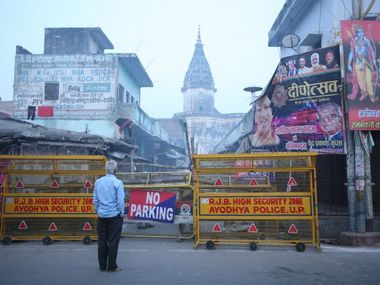The Indian Constitution is a document that is inclusive in nature. The framers of the Constitution were mindful of the varied religious, cultural and spiritual denominations that comprised the country. They chose to not only protect the religious freedoms of citizens but also prevent any discrimination on the basis of their religion (Article 29 of the Constitution). The Preamble to the Constitution also states that the Indian State is secular in nature. However, Indian secularism is different from the concept of secularism as understood in western nations. The Indian State believes and upholds through its institutions the right of all citizens to practice and uphold their religion. On 9 November 2019, amid high tensions, a five-judge Bench of the Supreme Court gave a unanimous verdict in the Ram Janmabhoomi-Babri Masjid dispute. The judgment comes 9 years after the Allahabad High Court judgment, wherein the court had divided the land among three parties — Ram Lalla, Sunni Waqf Board and the Nirmohi Akhara. [caption id=“attachment_7646881” align=“alignleft” width=“380”]  The site that was at the centre of the Ayodhya dispute, File image Getty images[/caption] The apex court on Saturday truly rose to the occasion and gave a historic, informed and balanced verdict in a matter over which religious tensions were simmering over 70 years. The judgment has decreed the suits by relying on the age old principles of natural justice, equity and good conscience. Most significantly, Supreme Court observed in its verdict that “the reliefs are moulded in the manner which preserves the constitutional values of justice, fraternity, human dignity and equality of the religious belief.” The said judgment upholds not only the basic values enshrined in the Constitution but has also demonstrated the value of the evidence provided and an impartial analysis thereof. In doing so, the Supreme Court has demonstrated the age-old principle — ‘justice should not only be done, but should manifestly and undoubtedly be seen to be done.’ In the present case, the Supreme Court was given a task of a unique dimension. The dispute was over title of immovable property. The law provides clear parameters for deciding ownership and possession and principles of evidence on the basis of which the same is to be adjudged. Accordingly, the Supreme Court based its verdict on the evidence provided and upheld the secular fundamentals of the Constitution. This judgment demonstrates in reality the unique power entrusted to the apex court under Article 142. The apex court is entrusted with great plenary power in the form of Article 142 which inter alia states that the Supreme Court in the exercise of its jurisdiction may pass such decree or make such order as is necessary for doing complete justice in any cause or matter pending before it. This article uses the word ‘complete justice’ rather than the term `justice`. The Supreme Court invoked Article 142 in the said judgment in respect of Nirmohi Akhara’s claim. Even as the court held that the Nirmohi Akhara’s claim was barred by limitation, it was of the view that historically, the Akhara had played an important role in Ayodhya. Therefore, the Supreme Court directed the Central government to include the Nirmohi Akhara in the body which would be responsible for management of the future temple land. The Supreme Court also invoked its power under Article 142 to direct the Central government to grant an alternate site measuring five acres ‘either by the Central Government out of the acquired land or by the Government of Uttar Pradesh within the city of Ayodhya.’ This was due to the injustice suffered by Muslim parties due to the illegal demolition of the mosque in 1992 which deprived them of their place of worship. The powers of the Supreme Court under Article 142, Article 32, Article 12 and Article 226 form the basis of judicial review. The members of the Constituent Assembly were unanimous when they decided that the power of review, though present, would not have a direct basis. Having said that, the founding fathers of the Constitution carved out a special stature for the Supreme Court. It was to be the watchdog of constitutional liberties. The Supreme Court was the institution which was entrusted with ensuring that constitutional guarantees did not remain mere paper promises. The fact that the independence of the Supreme Court itself is a feature of the b_asic structure_ of the Constitution gives it a unique position to decide contentious issues without fear or favour. The manner in which the Supreme Court conducted the hearing of the case also plays a very vital role. After a political deadlock and rising tensions, the court referred the matter for mediation. After the mediation failed to produce any concrete results, day to day hearings began in the matter in August 2019 until 16 October 2019. On 9 November 2019, the legal system, which is based on the country’s multicultural ethos was upheld through the judgment. In accordance with its power to do ‘complete justice’ under Article 142 of the Constitution, the Supreme Court truly upheld the relative nature of fundamental rights enshrined in the Constitution. The Supreme Court did not just decide the legal issue of title but chose to venture beyond, ensuring that equitable justice was granted by moulding reliefs which upheld the faith of all parties concerned. The author holds an LLM degree from London School of Economics and practices law in Mumbai.
The legal system, which is based on the country’s multicultural society was upheld through the judgment in the Ayodhya dispute.
Advertisement
End of Article


)

)
)
)
)
)
)
)
)



